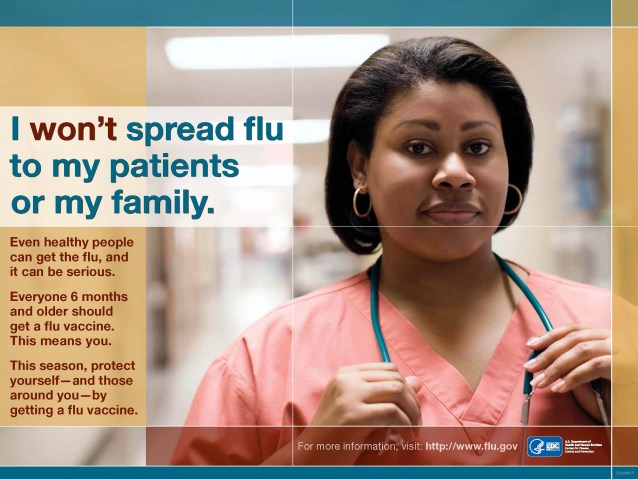
Fight influena
Protect yourself
Protect your patients
Protect your colleagues
People who work in healthcare, no matter the job type or setting, can unknowingly spread influenza virus to his or her close contacts, which may include our patients. For example, a cashier in the VUH cafeteria who is infected with influenza virus can spread the virus to coworkers, like the nurse from the oncology unit. That nurse could then become infected, and spread the virus to his patients.
To prevent the spread of influenza at VUMC, everyone should follow these key steps:
- Wash your hands
- Cover your cough
- Don’t work when sick – if you have respiratory symptoms (cough, runny nose) and a fever, please stay home
- Wear a surgical mask when seeing patients if you have respiratory symptoms and no fever
- Identify patients who may have influenza infection on arrival to VUMC and use appropriate isolation precautions
- Place a surgical mask on patients with confirmed or suspected influenza infection
- Ask visitors not to visit their loved ones if they have fever and respiratory symptoms
- Vaccinate your patients against influenza
- Get your annual flu vaccination!
VUMC policy requires annual influenza vaccination or exemption. Exemptions may be for religious or personal/philosophical beliefs or for medical contraindications. Those who wish to be exempted from receiving the flu vaccine must complete an exemption form, available on the OHC website beginning in September. Those personnel who receive an approved exemption from influenza vaccination must wear a mask during influenza season as per the VUMC Immunization Policy. More information on the masking requirement may be found here.
Influenza masking requirement policy PDF
In order to protect yourself, your colleagues, and our patients, we strongly encourage everyone working at VUMC to receive an annual influenza vaccine. Patient and worker safety are of utmost concern. We must do all we call to minimize the spread of influenza to others. Vaccinating healthcare workers against influenza has been associated in several studies with a reduced risk of patient mortality.
Common reasons why VUMC employees don’t get vaccinated
“I get the flu from the flu shot.”
None of the currently-licensed influenza vaccines can cause influenza infection. Of course, people may develop symptoms after vaccination (and even confirmed influenza). This does not mean the illness was vaccine-induced, but could be due to a non-influenza viral infection (as other viruses, such as RSV, also circulate during influenza season), to exposure to influenza before immunity from the vaccine has had time to develop, or to the fact that the vaccine is not 100-percent effective.
“I never get the flu, so I don’t need the vaccine.”
Healthy people can become infected with influenza and may not have the typical “flu-like illness.” You may have a runny nose or mild cough instead. You can even have no symptoms and still be able to spread the virus to others. Remember, the vaccine is to protect you as much as it is to protect those around you.
“I won’t come to work when I am sick.”
Unfortunately, you may be infected with influenza virus and start spreading virus to others even before you have any symptoms. Plus, you may not have very severe symptoms (e.g. just a runny nose). Finally, studies show that sick healthcare workers come to work about 75-percent of the time.
“The vaccine does not work.”
While there have been a lot of confusing messages about the effectiveness of the influenza vaccine, the best studies do show that it works fairly well for most seasons. In fact, many of these studies were done right here at VUMC. In general, the influenza vaccine has an effectiveness of about 60 percent, which admittedly is not as effective as other common vaccines. However, “not as effective” does not mean “not effective.” While we all want a better vaccine, the one we have now is pretty good, and 60 percent is better than zero.
“My patients are vaccinated.”
Unfortunately, many of our patients (including neonates, infants, older adults, immunosuppressed patients) cannot mount the same immune response to the vaccine as a healthy adult. If we get vaccinated, we help protect those patients.
